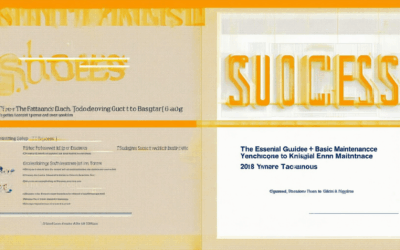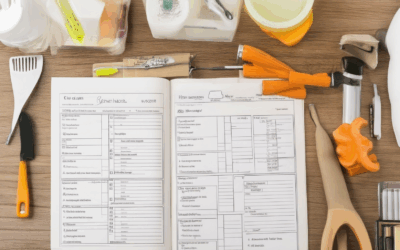Are you ready to transform your home into a space that feels fresh, functional, and truly yours? Whether you’re a seasoned DIY enthusiast or new to home improvement, finding the right tips to get started can feel overwhelming. From planning your project to staying within budget, ensuring safety, and enhancing energy efficiency, there’s a lot to consider. But don’t worry—we’ve got you covered. In this article, we’ll walk you through the essential home improvement tips every homeowner needs to know, helping you navigate the process with confidence and ease. Let’s dive in and discover how you can achieve your dream home while avoiding common pitfalls along the way.
Key Takeaways
– Boost Property Value: Regular home improvements can significantly increase your home’s resale value.
– Save Money Over Time: Addressing issues early prevents costly repairs, such as fixing leaky pipes to avoid water damage.
– Improve Safety: Install smoke detectors, fix loose tiles, and secure windows to protect your family.
– Enhance Comfort: Upgrade insulation, install smart home systems, and add outdoor amenities for a more enjoyable living space.
– Stay Competitive: A well-maintained home stands out in the market, making it more appealing to potential buyers.
– Top 10 Tips Include: Energy efficiency upgrades, curb appeal enhancements, safety measures, kitchen and bath updates, space optimization, smart technology integration, regular maintenance, functional layouts, landscaping investments, and DIY projects.
– Maintenance is Key: Regular checks on HVAC, plumbing, and electrical systems prevent hazards and extend component lifespans.
– Curb Appeal Matters: Fresh paint, updated landscaping, and exterior upgrades can significantly boost your home’s value.
– Invest in Repairs: Repair or replace flooring, update kitchens and baths, and install modern fixtures for improved aesthetics and functionality.

What Are the Essential Things You Should Know Before Starting Any Home Improvement Project?
- Budgeting Wisely: Determine your project’s total cost and set aside 10-15% more than your estimated budget for unexpected expenses. Use tools like spreadsheets or budgeting apps to track expenses.
- Permits and Regulations: Research local building codes and obtain necessary permits before starting. Failure to comply could result in fines or delays.
- Thorough Planning: Create a detailed plan outlining scope, timeline, and budget. Prioritize tasks based on importance and feasibility. Use resources like our home improvement planning guide for assistance.
- Understanding Timelines: Estimate realistic completion dates, considering dependencies like material delivery and labor availability. Use our scheduling tips to manage expectations.
- Material Selection: Research high-quality materials and compare options. Consider durability, sustainability, and long-term costs. Check out our material selection guide for more details.
- Tools and Equipment: Ensure you have the necessary tools for the job. Rent or purchase equipment if needed. Explore our tool guide for recommendations.
- Hiring Professionals When Necessary: For complex projects, hire licensed contractors. Verify their credentials and read reviews. Use platforms like our directory to find reliable professionals.
- Waste Management: Plan for waste disposal, especially for large projects. Use bins or schedule trash pickup in advance. Learn more in our waste management guide .
- Stay Flexible: Adjust plans as needed due to unforeseen issues like weather or supply shortages. Maintain open communication with your team or contractor.
What Are the Essential Things You Should Know Before Starting Any Home Improvement Project?
- Budgeting Wisely: Determine your project’s total cost and set aside 10-15% more than your estimated budget for unexpected expenses. Use tools like spreadsheets or budgeting apps to track expenses.
- Permits and Regulations: Research local building codes and obtain necessary permits before starting. Failure to comply could result in fines or delays.
- Thorough Planning: Create a detailed plan outlining scope, timeline, and budget. Prioritize tasks based on importance and feasibility. Use resources like our home improvement planning guide for assistance.
- Understanding Timelines: Estimate realistic completion dates, considering dependencies like material delivery and labor availability. Use our scheduling tips to manage expectations.
- Material Selection: Research high-quality materials and compare options. Consider durability, sustainability, and long-term costs. Check out our material selection guide for more details.
- Tools and Equipment: Ensure you have the necessary tools for the job. Rent or purchase equipment if needed. Explore our tool guide for recommendations.
- Hiring Professionals When Necessary: For complex projects, hire licensed contractors. Verify their credentials and read reviews. Use platforms like our directory to find reliable professionals.
- Waste Management: Plan for waste disposal, especially for large projects. Use bins or schedule trash pickup in advance. Learn more in our waste management guide .
- Stay Flexible: Adjust plans as needed due to unforeseen issues like weather or supply shortages. Maintain open communication with your team or contractor.

What Are the Essential Things You Should Know Before Starting Any Home Improvement Project?
- Budgeting Wisely: Determine your project’s total cost and set aside 10-15% more than your estimated budget for unexpected expenses. Use tools like spreadsheets or budgeting apps to track expenses.
- Permits and Regulations: Research local building codes and obtain necessary permits before starting. Failure to comply could result in fines or delays.
- Thorough Planning: Create a detailed plan outlining scope, timeline, and budget. Prioritize tasks based on importance and feasibility. Use resources like our home improvement planning guide for assistance.
- Understanding Timelines: Estimate realistic completion dates, considering dependencies like material delivery and labor availability. Use our scheduling tips to manage expectations.
- Material Selection: Research high-quality materials and compare options. Consider durability, sustainability, and long-term costs. Check out our material selection guide for more details.
- Tools and Equipment: Ensure you have the necessary tools for the job. Rent or purchase equipment if needed. Explore our tool guide for recommendations.
- Hiring Professionals When Necessary: For complex projects, hire licensed contractors. Verify their credentials and read reviews. Use platforms like our directory to find reliable professionals.
- Waste Management: Plan for waste disposal, especially for large projects. Use bins or schedule trash pickup in advance. Learn more in our waste management guide .
- Stay Flexible: Adjust plans as needed due to unforeseen issues like weather or supply shortages. Maintain open communication with your team or contractor.

Why Are Essential Home Improvement Tips Crucial for Any Homeowner?
Essential home improvement tips are vital for homeowners as they offer numerous benefits that enhance daily living, increase property value, and save money in the long run. Here’s a breakdown of why these tips matter:
- Boost Property Value : Regular home improvements can significantly increase your home’s resale value. Whether it’s updating outdated fixtures, improving energy efficiency, or renovating the kitchen, these changes appeal to potential buyers.
- Save Money Over Time : Preventative maintenance and small fixes can prevent costly repairs later. For example, addressing leaky pipes early can stop water damage, which often leads to expensive renovations.
- Improve Safety : Many home improvement projects focus on safety. Installing smoke detectors, fixing loose floor tiles, or securing windows can protect your family from accidents and injuries.
- Enhance Comfort : Upgrading to better insulation, installing smart home systems, or adding outdoor amenities like patios can make your home more enjoyable and comfortable for everyone.
- Stay Competitive in the Market : Keeping your home in great shape helps it stand out when listing it for sale. Potential buyers are more likely to consider a well-maintained property over one that needs extensive work.
At Sams Maintenance, we understand the importance of these tips and offer expert advice to help you maintain and improve your home effectively. From DIY projects to professional services, our resources empower you to keep your property in excellent condition. Check out our website for detailed guides and tips tailored to your needs.
Remember, competition in real estate is fierce, and staying ahead means prioritizing home improvements. Start today by exploring our maintenance guides and begin transforming your space into a more functional and valuable asset.
Top 10 Essential Home Improvement Tips Every Homeowner Should Consider
- Improve Energy Efficiency : Replace outdated appliances with ENERGY STAR-certified ones to reduce utility bills. Install high-efficiency windows and insulation to keep your home cooler in summer and warmer in winter.
- Boost Curb Appeal : A fresh coat of paint, updated landscaping, and a well-maintained exterior can significantly increase your home’s value. Consider minor renovations like a new front door or deck to enhance curb appeal.
- Enhance Safety : Install smoke detectors, carbon monoxide detectors, and security systems to protect your family. Regularly inspect electrical systems and fixtures to prevent hazards.
- Update Kitchen and Baths : Modernize your kitchen with energy-efficient appliances and durable countertops. Renovate bathrooms to improve water pressure and storage space, which can add significant value to your home.
- Optimize Space : Utilize unused areas like attics, basements, or garages for additional storage or functional spaces. This can help declutter your home and improve organization.
- Consider Smart Home Technology : Integrate smart devices into your home for better convenience and energy management. Use apps to control lighting, thermostats, and security systems remotely.
- Regular Maintenance : Schedule routine inspections for plumbing, HVAC systems, and roofing to catch issues early. Preventative maintenance can extend the lifespan of your home components and save money on repairs.
- Focus on Functional Layout : Rearrange furniture for better workflow and accessibility. Use multi-functional furniture to maximize space and improve overall functionality.
- Invest in Landscaping : A well-manicured lawn, neat garden beds, and proper tree trimming can enhance your home’s exterior appearance and contribute to a welcoming atmosphere.
- Explore DIY Projects : Take on manageable DIY projects to personalize your home. Start with small tasks like painting walls or updating decor to build your DIY skills gradually.
For more detailed guides and resources, visit Sams Maintenance to discover expert tips and step-by-step tutorials tailored for homeowners.

What Are the Top Essential Home Improvement Tips Every Homeowner Should Follow?
Homeownership requires ongoing care and attention to maintain the value and functionality of your property. Here are the top essential home improvement tips every homeowner should consider:
-
Maintenance is Key
-
Regular Check-Ups
- Inspect HVAC systems annually to ensure efficient operation.
- Check plumbing pipes for leaks and wear.
- Schedule routine electrical inspections to prevent hazards.
-
Energy Efficiency
- Upgrade to energy-efficient appliances to reduce utility bills.
- Install high-quality insulation to maintain interior temperatures.
- Consider smart home devices for better energy management.
-
Safety First
- Test smoke detectors monthly and replace old ones every 10 years.
- Install a home security system to protect against break-ins.
- Ensure staircases and hallways are well-lit to prevent accidents.
-
-
Improve Curb Appeal
-
Landscape Enhancements
- Plant shrubs and trees to add beauty and shade.
- Install a well-designed garden or outdoor lighting.
- Add a patio or deck for outdoor entertaining spaces.
-
Exterior Upgrades
- Replace old windows with energy-efficient options.
- Refinish or repaint exterior doors for a fresh look.
- Consider a new roof if yours is nearing the end of its lifespan.
-
-
Invest in Home Repairs
-
Flooring Solutions
- Repair or replace damaged flooring materials.
- Consider installing hardwood floors for durability.
- Update bathroom and kitchen flooring for improved aesthetics.
-
Kitchen and Bathroom Updates
- Replace outdated cabinetry with modern designs.
- Install new countertops for a sleek look.
- Upgrade fixtures to enhance functionality and style.
-
By following these tips, you can maintain your home’s value, ensure safety, and create a more enjoyable living environment. Remember to consult professionals for complex projects and stay updated on the latest trends in home improvement.




0 Comments